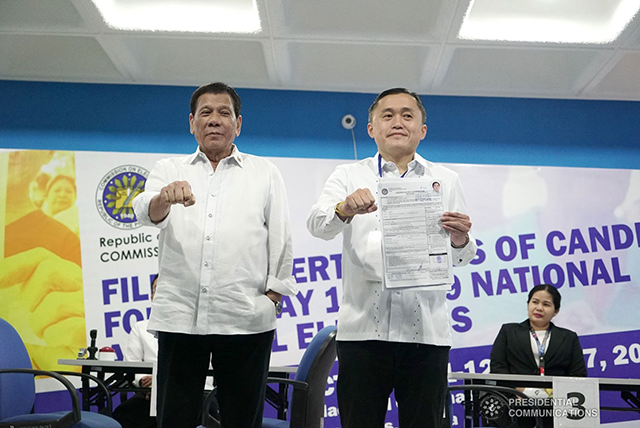Too Much, Too Soon: Premature Campaigning via Media Exposure

Photo from Presidential Communications Operations Office website.
AS THE midterm elections draw near, the electorate is once again being deluged with a tsunami of premature campaigning. The official campaign period has yet to begin, but some candidates for public office already have a head start over their rivals. Their names and faces are plastered everywhere, on posters, tarpaulins and billboards. The public is also being bombarded this early with advertisements in print, broadcasting and social media.
Instead of calling attention to these candidates’ premature campaigning, some media organizations are giving these politicians undeserved publicity. Print media have been publishing reports with little news value about certain senatorial candidates. Thankfully, broadcast media have not been as uncritical. There were no reports about candidates in the primetime newscasts—at least when CMFR monitored seven broadsheets (Philippine Daily Inquirer, The Philippine Star, Manila Bulletin, The Manila Times, Manila Standard, Daily Tribune and Malaya Business Insight), four primetime news programs (ABS-CBN 2’s TV Patrol, GMA-7’s 24 Oras, TV5’s Aksyon and CNN Philippines’ News Night) and selected online news sites from November 1 to 8, 2018.
Through the Loophole
Candidates are getting away with premature campaigning on a technicality. According to Sec. 80 of the Omnibus Election code, election campaign or partisan political activity outside the campaign period is “unlawful.”
But in the highly controversial 2009 landmark case of Penera vs. Comelec, the Supreme Court declared that with respect to RA 8436 or the Poll Automation Law “a candidate is only liable for election offenses upon the start of the campaign period.”
At present, it is legally impossible to commit premature campaigning. Before the campaign period, political aspirants are not yet considered official candidates and therefore not liable for electoral offenses.
Some lawmakers want to penalize premature campaigning. Senators Leila de Lima, Richard Gordon and Aquilino Pimentel III have authored Senate Bill 2064, which redefines the term “candidate” as a person who filed his COC within the period provided by the Comelec. Gordon said the present definition of the offense “…propagates political inequality as it unduly favors rich or popular candidates over poor or less popular candidates.” It also provides candidates in office unfair advantage if they are allowed to advertise their accomplishments in office.
COMELEC is appealing to lawmakers for the immediate passage of the bill against premature campaigning. Without the bill, candidates will get away with campaigning from now until the official start of the campaign period on February 12, 2018.
Despite reporting these developments, media failed to point out premature campaigning as a prevalent problem with no proposed solution, recurring every election period which gives those candidates with huge campaign funds an advantage over poorer but deserving candidates.
Making Kings Out of Clowns
Former Special Assistant to the President (SAP) Christopher “Bong” Go’s only claim to fame is his loyalty to the president. He has been executive assistant and personal aide to President Rodrigo Duterte since 1998. Aside from his involvement in the frigate scandal and his notoriety as “selfie king,” we know little of this businessman from Davao.
Lack of qualification has not stopped him from seeking a seat in the Senate. His “Ready, Set, Go” campaign started as early as March this year.
Reporters have supported Go with headlines since then. On November 5, The Manila Times reported that fire prevention will be part of his legislative priority. On November 8, The Philippine Star reported Go’s appeal for government agencies to rush the Yolanda rehabilitation. Go is hardly an expert on these issues and is no longer the president’s close companion; but media have readily given him column space in news pages.
Notably, media also covered other candidates. Although some reports were substantial, most were not. Understandably, media covered incumbent officials seeking re-election, and who had something newsworthy to say, among them Sen. Loren Legarda, Sen. Bam Aquino and Davao City Mayor Inday Sara Duterte, but it defies reason why those who were neither were also covered.
During the monitoring period, some of the other candidates that made it to the headlines include former journalist Jiggy Manicad, Freddie Aguilar and Ilocos Norte Gov. Imee Marcos.
There were at most four reports each for these candidates. Bong Go stood out for the number of reports on him. With at least eleven reports from the monitored newspapers, the Go reports outnumbered those on the others significantly.
Brash and Brazen
Taking advantage of the Comelec ruling on what constitutes premature campaigning, other senatorial candidates were just as brazen as Go. Six months ahead of the campaign period, Imee Marcos had already launched her campaign dubbed #Imeesolusyon through a TV advertisement. It aired on a major TV network on October 29 with the core message of “Maraming may opinyon. Tayo may solusyon”.
Even the president himself engaged in premature campaigning when he endorsed folk singer and senatorial candidate Freddie Aguilar. Despite the fact that the president raised Aguilar’s arm and shouted, “Vote for Freddie Aguilar!,” Presidential Spokesperson Salvador Panelo claimed his “expression of support” was not a form of premature campaigning. The president also appears in Go’s political ads.
It is legitimate to report on candidates if they are involved in events or activities with news value. But this also gives incumbent candidates a natural if unfair advantage, because everything a candidate in office does can be so justified.
To help create an informed electorate and to elevate the electoral discourse, the media should be doing stories on the truly news-worthy candidates who have clear, relevant, feasible and necessary programs of government. But the media have not been as discerning.
Leave a Reply